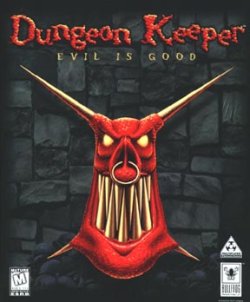Dungeon Keeper
| Dungeon Keeper | |
|---|---|

North American box art for Dungeon Keeper
|
|
| Developer(s) | Bullfrog Productions |
| Publisher(s) | Electronic Arts |
| Designer(s) | Peter Molyneux |
| Programmer(s) | Simon Carter |
| Artist(s) | Mark Healey |
| Composer(s) | Russell Shaw |
| Series | Dungeon Keeper |
| Engine | Magic Carpet |
| Platform(s) | MS-DOS, Windows 95 |
| Release |
|
| Genre(s) | Real-time strategy, god game, dungeon management game |
| Mode(s) | Single-player, multiplayer |
| Review scores | |
|---|---|
| Publication | Score |
| CGW | |
| CVG | |
| Edge | 9/10 |
| GameSpot | 9/10 |
| PC Gamer (UK) | 95% |
| Game Revolution | A |
| Gamezilla | 93/100 |
| PC Zone | 8/10 |
| Jeuxvideo.com | 17/20 |
| Computer Games Strategy Plus | |
| Next Generation | |
Dungeon Keeper is a strategy video game developed by Bullfrog Productions and released by Electronic Arts in June 1997 for MS-DOS and Windows 95. In Dungeon Keeper, the player builds and manages a dungeon, protecting it from invading 'hero' characters intent on stealing accumulated treasures, killing monsters, and ultimately the player's demise. The ultimate goal is to conquer the world by destroying the heroic forces and rival dungeon keepers in each realm. A character known as the Avatar (resembling the Avatar from Ultima VIII: Pagan) appears as the final hero. Dungeon Keeper uses Creative Technology's SoundFont technology to enhance its atmosphere. Multiplayer with up to four players is supported using a modem, or over a local network.
Dungeon Keeper took over two years to develop, and an expansion pack, a Direct3D version, and a level editor were released. Midway through development, Molyneux decided to leave Bullfrog when the game was complete, which was the motivation for its success. Versions for the Sega Saturn and Sony PlayStation were in development, but cancelled. The game received critical acclaim, with reviewers praising the uniqueness and depth. Dungeon Keeper was re-released on gog.com in 2011, and on Origin in 2016. A fan-made mod, KeeperFX, was released, which fixes bugs and adds features. Dungeon Keeper was followed by a sequel, Dungeon Keeper 2, in 1999.
The player constructs and manages a dungeon, recruiting and catering for minions to run it and defend it from enemy invaders. The primary method of control is the hand, used to pick up creatures and objects in the dungeon, carry them around, and drop them. The hand allows the player to 'slap' creatures and objects, and interact with them.Dungeon Keeper's gameplay exemplifies a dark sense of humour.
...
Wikipedia
